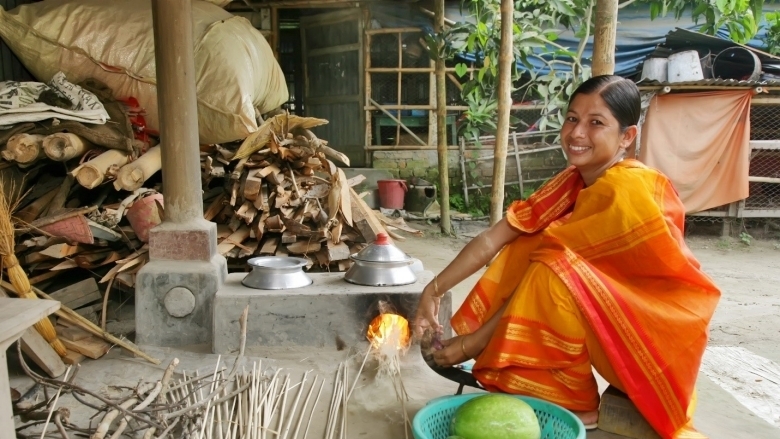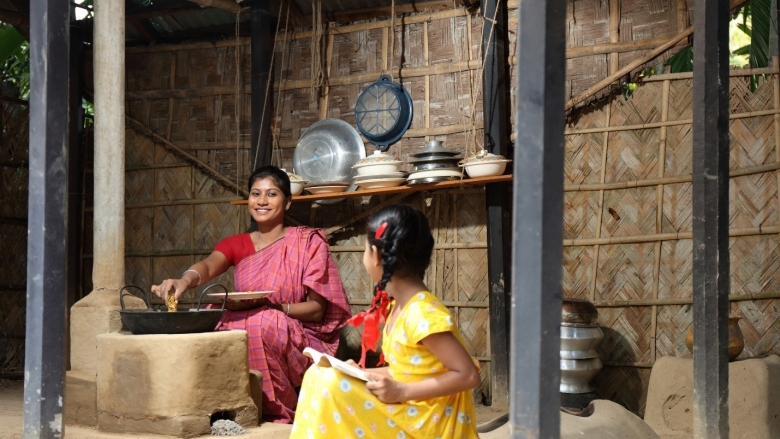News
According to World Health Organization estimates, over 4.3 million die annually from Indoor Air Pollution (IAP) related issues globally. In Bangladesh alone - there are over 107,000 deaths annually because of IAP, the prime cause being traditional wood fired stoves. An Improved Cook Stoves (ICS) program in Bangladesh has helped install more than 1.6 million cleaner and more efficient cookstoves in homes around the country, leading to significant health benefits for women and children by helping reduce indoor air pollution drastically. The cookstoves have also helped families spend less on fuel (like firewood and dung), and has led to women spending less time in the kitchen.
Challenge
Three billion people around the world still use traditional and polluting cookstoves using fuels like firewood and cow dung to cook and heat their homes, leading to serious indoor air pollution. The estimated health, environmental and economic cost of the continued use of this practice is staggering and estimated at over $123 billion every year.
Despite these health and economic implications, families were reluctant in the past to make the switch to cleaner, more efficient cookstoves due to a lack of awareness and fear that the quality and taste of their meals would not be the same. But that is changing with sustained efforts through the ICS program, which began addressing the problem holistically in May 2013 by focusing on the gender and health aspects of cleaner cooking. The ICS program also began supporting women as a part of the supply chain for the cleaner cookstoves, helping them generate an income and in turn, reducing poverty in rural households.

The ICS program was developed by Bangladesh’s Infrastructure Development Company Limited (IDCOL) in partnership with the World Bank to mobilize a network of local entrepreneurs, partners and financing to that led to the success of the program. The program brings together financing from International Development Association (IDA) and Green Climate Fund (GCF) in Phase II of the program to scale it up.
The Gender Mainstreaming Aspect: The ICS program worked closely with local village level influencers and early adopters to create awareness on clean cookstoves- this led to increase in adoption. Women also formed a part of the supply chain-generating an income- that helped them move out of poverty while implementing a multi-level awareness creation campaign through village meetings, rural folk songs, rural product display, exhibition etc. This helped in local adoption across villages.
The ICS Service Delivery Innovation: The program has established a results-based framework where Partner Organizations (POs) are funded based on their performance- with payouts for the sales activities occurring based on a variable scale. This has led to an alignment between incentives and sales increase; this supports the development of cookstoves locally- that suit customer preferences and not just have the highest margins.

- The ICS program, which began in May 2013, distributed one million improved cookstoves by January 2017, almost two years ahead of schedule. All the direct beneficiaries were women, and the program now aims to reach an estimated five million users by 2021, in its second phase of implementation.
- As of June 2018, around 1.6 million improved cookstoves have been distributed in the country.
- The cookstoves, which were tested by the Bangladesh University of Engineering Technology in 2017, showed over 20 percent reduction in PM 2.5, which are harmful air pollutant particles, and 90 percent reduction in carbon monoxide emissions.
- The program has created over 3,000 direct and indirect jobs for women, with seven partner organizations being led by women.
- The ICS program is estimated to reduce GHG emissions by 2.890 MtCO2eq with a total lifetime emission reduction of 10.526 MtCO2eq.
- Assuming a fair price for the carbon units- on an average- the carbon credits will earn the program over $25 million. This funding will support the program in becoming sustainable beyond its time frame of 2021.
- Surveys and tests done on the improved cookstoves show that the program has helped reduce the use of firewood by over 58 percent.
- The cookstoves have saved over 375.84 Bangladeshi Taka per stove per month, resulting in cumulative savings of over 600 million Bangladeshi Taka. The program will reduce the time taken by each user-to collect firewood-by 102 hours/year.
- The program has mobilized an additional $20 million from the GCF with support from Energy Sector Management Assistance Program (ESMAP) in February 2018, taking the overall size of the second phase of the program to $82 million achieving a total direct of 5 million women clients and 17.6 overall beneficiaries by 2021.
Partners
Supported by the Government of Bangladesh, IDCOL is the implementation partner in the country that promotes, identifies partner organizations and implements the ICS program, IDA has leveraged its professional network by partnering with the Global Alliance for Clean Cookstoves (GACC or the Alliance) to provide strategic inputs and funding from the Green Climate Fund to scale the program. ESMAP has supported the ICS program from Phase 1 through -to the current Phase 2- proposal to raise scale up funding from GCF.
The program is also collaborating with World Bank teams in Climate Change, Energy and Environment. Lessons learnt from Bangladesh will be folded into the ESMAP-funded “Promotion of Tier 4 Emission Performance ICS in India, Nepal, and Bangladesh” activity, which will share knowledge and best practices among the country programs.
Moving Forward
The program ties in with Bangladesh’s vision to achieve 100% coverage of improved cookstoves by 2030 as per its Government’s Country Action plan for Improved Cookstoves. Together, Phase I (the baseline project) and Phase II (the scale-up project) will reach four million households, leaving the market positioned well to reach the remaining 25 million households. Moreover, the IDA program establishes a strong network of microentrepreneurs and rural supply chains that actively engage women in the workforce. Scaling up further, the market is established for progressive movement toward promotion of more efficient and lower emission technologies.
